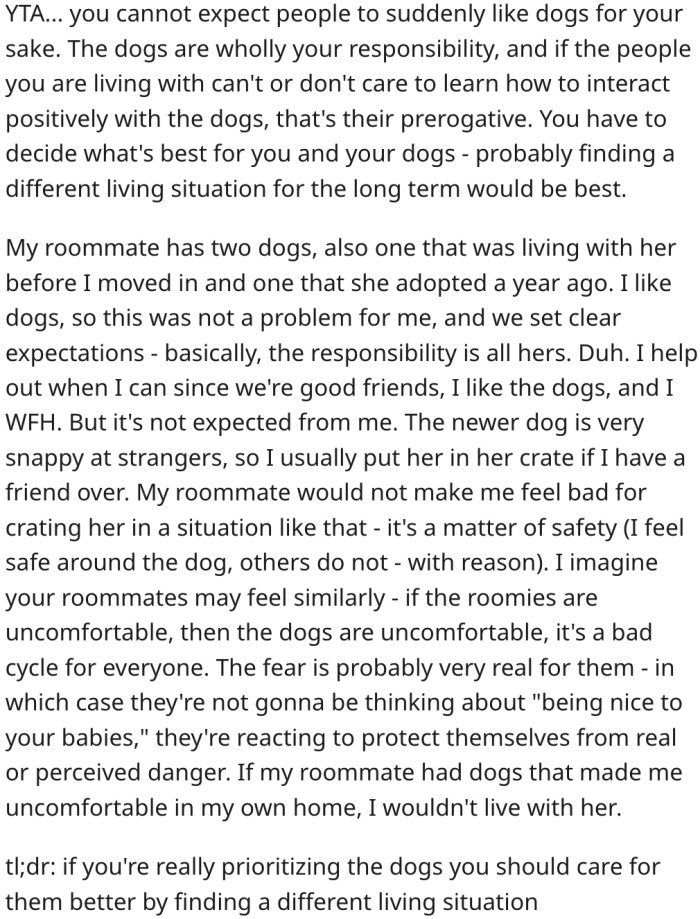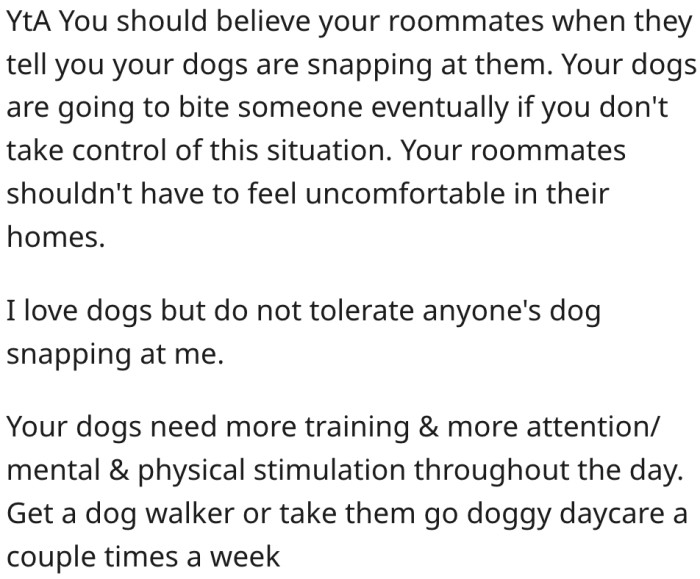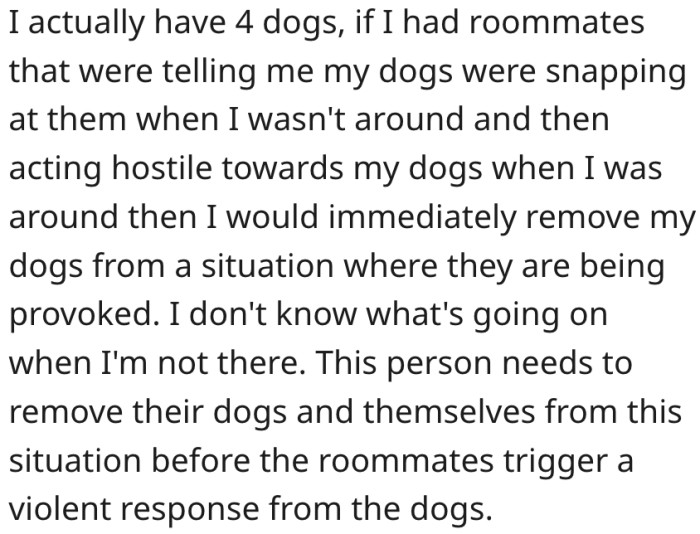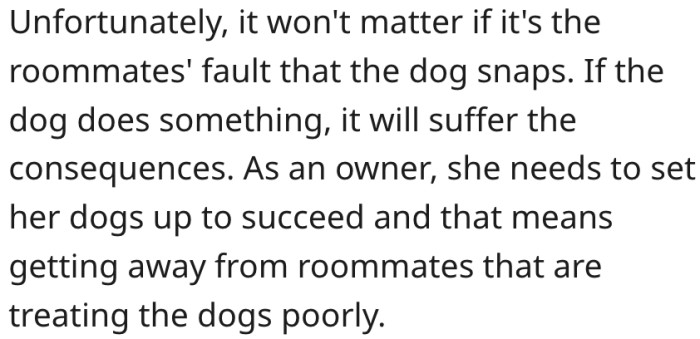Woman Rewards Dogs For Barring Their Teeth To Roommates And Has Pledged Not To Discipline Bad Behavior
One Reddit user, A_little_brat92, took to the "AITA" subreddit to narrate the relationship between her dogs and her roommates. A_little_brat92 disclosed that she has two roommates: a female named Jill and a male named Jack.
Although she considers Jill one of her good friends, she has issues with both roommates due to their dislike for her dogs—a German Shepherd, a Cane Corso German Rottweiler, and a miniature pitbull mix. The roommates are cat people and have very little patience for the dogs.
They complain about the dogs snapping at them for no reason but neglect to mention that they left the dogs in their kennel for eight hours with an empty or dirty water bowl. A_little_brat92 came home one day to find her roommates upset because one of the dogs showed his teeth to Jill when she wanted to discipline him and to Jack when he stepped in.
A_little_brat92 ignored her roommates and rewarded the dogs, which led to a fight with Jack because he felt she was rewarding them for bad behavior. A_little_brat92 believes that the dogs don't like her roommates and that her roommates go out of their way to make everything the dogs do a problem, even going so far as to make comments about hurting or killing the dogs.
A_little_brat92 has concluded that she will not correct the dogs whenever they are "a-holes" to her roommates. However, she wants to know if she's the asshole in the situation.
Here's what the AITA community thinks.
Here's OP's post.

Is she wrong for rewarding bad behavior? Reddit responds.

1. They are incompatible roommates.

The Psychology of Animal Behavior
Research into animal behavior highlights that rewarding certain behaviors can reinforce those actions in the future. Positive reinforcement, as noted by behaviorists like B.F. Skinner, is a powerful tool in training pets.
However, this can create confusion if not applied consistently, particularly in multi-pet households. The roommates' concerns may stem from a fear of aggressive behaviors being inadvertently reinforced.
Navigating Coexistence in Shared Spaces
Living with pets can significantly impact the dynamics of shared living arrangements, often requiring negotiation and compromise.
According to research published in the Journal of Environmental Psychology, pet ownership can influence social interactions and create unique challenges in communal living.
This is particularly true when the needs and behaviors of pets clash with the preferences of human roommates, as seen in this situation.
2. She's in the wrong for leaving her dogs in their kennels for eight hours.

3. It's unlikely her roommates intentionally provoke two big aggressive dogs.

4. She's a horrible roommate.

From a psychological standpoint, this scenario illustrates the concept of cognitive dissonance, where individuals struggle to reconcile conflicting beliefs and behaviors. The roommates may feel discomfort knowing that the woman's approach to training contradicts their beliefs about responsible pet ownership.
Behavioral psychologists emphasize that rewarding certain behaviors, such as showing teeth in dogs, can lead to unintended consequences.
Studies have shown that reinforcement, when not carefully managed, can encourage unwanted behaviors rather than diminish them.
In this case, the woman may inadvertently validate aggressive behavior in her dogs, which could strain roommate relationships.
5. It's unwise to have such dogs and live with roommates.

6. Pets should be among the things considered when making living arrangements.

7. Creating a conducive home for the dogs is her responsibility.

Conflict Resolution Strategies
To foster coexistence in this mixed household, implementing structured communication strategies can be beneficial. Dr. Alexandra Solomon, a renowned relationship therapist, states, "Open and honest communication is essential for resolving conflicts and building trust among housemates." You can find more insights on her approach at dralexandrasolomon.com. Regular house meetings to discuss concerns and collaboratively develop pet training approaches can help ease tensions and clarify expectations.
The Importance of Clear Boundaries
Establishing clear boundaries around pet behavior and expectations is essential for harmonious living.
Dr. Sheila D. Dwyer, a behavioral therapist at Emory University, suggests that clear communication about pet behavior can prevent misunderstandings.
Her research indicates that proactive discussions about acceptable pet behaviors can lead to more peaceful coexistence.
8. Her living arrangement isn't ideal for large dogs.

9. It makes no sense that she expects cat lovers to care for her dogs.

10. If she doesn't get the dogs under control, they may bite her roommates.

In situations like this, it's crucial to establish boundaries and guidelines regarding pet behavior and training techniques. A compromise could involve agreeing on certain training methods that are acceptable to all parties involved.
Studies show that collaborative problem-solving can lead to more harmonious living situations and improved relationships among roommates.
In situations where pets are involved, it's beneficial to implement a system of shared responsibilities among roommates.
Studies show that co-creating guidelines for pet care can enhance mutual respect and reduce conflicts.
This may include setting specific times for pet activities or establishing rules for interactions with pets to ensure everyone feels comfortable.
11. It's dangerous to overlook dogs snapping at people.

12. She should move out to protect her dogs.

13. Dogs are unfriendly to people who maltreat them.

Understanding Human-Animal Relationships
The bond between humans and animals is profound and often reflects our emotional needs. Psychologists note that pets can serve as emotional support, providing comfort and companionship.
However, misunderstandings about pet behavior can lead to friction in shared living environments, as seen with the disagreements between the woman and her roommates.
Behavioral Management Techniques
To effectively manage pet behavior, incorporating training techniques that promote positive behavior is crucial.
Dr. Karen Overall's research on canine behavior emphasizes the importance of consistent training and reinforcement in shaping desired behaviors.
Enrolling pets in structured training programs can help mitigate aggressive tendencies while fostering a more harmonious living environment.
14. She shouldn't blame her roommates for leaving the dogs in their kennel for eight hours.

15. It's sad that her roommates have to deal with her mess.

16. Dogs won't snap at you unless you provoke them.

17. She needs to move out before things become violent.

18. Dog owners should provide a healthy environment for their dogs to thrive.

19. Dog owners are wrong in thinking dogs cannot attack someone without provocation.

20. You shouldn't have a dog if you work long hours away from home.

What do you think?
Dog owners should take their dogs snapping at someone, whether it is provoked or not, very seriously. Snapping can indicate fear, aggression, or discomfort and can lead to bites and serious injuries.
Additionally, it can damage the dog's reputation and lead to legal repercussions for its owners. Taking proactive measures such as obedience training, socialization, and proper management can help prevent snapping behavior and ensure the safety of both dogs and people.
By taking this issue seriously, dog owners can help ensure their dogs are well-behaved and enjoyable companions. What do you think of OP's situation?
Psychological Analysis
This scenario illustrates the complexities of shared living arrangements, particularly when pets are involved. The need for clear communication about expectations is vital to ensure that all roommates feel respected and comfortable.
Addressing behavioral issues proactively can also prevent conflicts and promote a harmonious atmosphere.
Analysis generated by AI
Analysis & Alternative Approaches
Navigating pet ownership in shared living spaces requires understanding and collaboration among all parties involved.
Psychological research highlights that clear communication and structured boundaries can significantly enhance coexistence.
Ultimately, fostering mutual respect and understanding is key to creating a peaceful living environment for both people and pets.
Analysis & Alternative Approaches
By understanding the dynamics of human-animal relationships and employing effective communication strategies, the woman and her roommates can create a more harmonious living situation. Psychological research underscores that addressing conflicts openly leads to better outcomes in shared environments.



